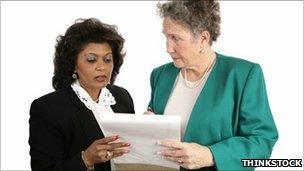Pension age plans for women are 'unfair'
- Published

Thousands of women, now in their late 50s, will have to wait up to two years longer for their pensions
Plans to speed up increases in the state pension age for women are facing mounting pressure from backbenchers.
It is set to rise from 60 to 65 by 2018 - two years earlier than previously agreed - so the age for both sexes can then be increased to 66 by 2020.
It will mean about 330,000 women, in their late 50s, will have to work for up to two years longer than planned.
The Pensions Bill has its second reading on Monday and ministers insist it will go ahead without any changes.
'Injustice'
Last year, Chancellor George Osborne announced plans to accelerate the rate at which women's pension age will rise to equal that of men, currently 65.
The previous government had agreed to achieve equalisation by April 2020, but the coalition's plans will see it achieved by November 2018.
Michelle Mitchell from Age UK: "A relatively small group is paying a disproportionate price"
It means thousands of women, now in their late 50s, will end up having to wait up to two years longer for their pensions.
Some MPs and charities say a small group of women are paying a disproportionate price.
Conservative MP James Gray urged the coalition government to think again.
"Going around the corridors and tea rooms in Westminster talking to Tories, Lib Dems and of course Labour MPs they are saying this is an injustice being done to a small number of people," he said.
"It's not a big number, we are not talking about billions of pounds, it's a reasonably small amount of money to right something which possibly has been done inadvertently wrong."
Liberal Democrat MP Stephen Lloyd said he was hopeful the Treasury was listening and it would make a change to "suit everyone".
'Growing rebellion'
Dr Ros Altman, director general of the Saga group and a former government advisor on pensions, agrees it would be the wrong decision to go ahead as planned.
"There's a growing backbench rebellion so the government is at risk of losing the vote in the Commons anyway, if this were to come to the Commons," she said.
"But we would hope that it wouldn't actually get to that point and in fact there does seem to be reliable indication the government is thinking again."
Michelle Mitchell from Age UK says a small group of women are paying a disproportionate price because the changes are being brought in too quickly.
"At the moment they're going to have the double whammy of equalisation of state pension age and then a hike in the state pension age," she said.
Many of the women are carers and have broken work records, she says, while others are struggling to find work in their late 50s and early 60s.
"Those worst affected, that's those born between 1953 and 1954, are going to lose on average about £10,000 a year," she added.
Labour has said the change was "profoundly and arbitrarily unfair" and left many women with just a few years to plan.
Conservative MP Harriet Baldwin, who sits on the pension select committee, rejected suggestions the changes were motivated by reducing the deficit.
"This would have to be done whether we were in deficit or in surplus, this has got nothing to do with the financial situation, it's to do with longevity and increasing life expectancy," she said.
"Just since 2004 when the original proposals were put forward there's been a further increase in life expectancy by one and a half years."
- Published8 June 2011
- Published20 October 2010